Jakarta — Indonesian officials detected trace radioactivity at a clove farm on Sumatra as the government broadened its probe sparked by the U.S. FDA’s finding of Cesium-137 in Indonesian spices, a government spokesperson said Tuesday, according to AFP.
The FDA recently reported detecting Cesium-137 in a screening sample of cloves from PT Natural Java Spice, after the isotope was also found in August in a sample of frozen shrimp from Indonesia.
Following that alert, the government sent inspection teams to a processing facility and a farm on Java and to another farm on Sumatra, task force spokesperson Bara Hasibuan said, according to AFP. He said only the clove farm in Lampung, Sumatra showed traces of radioactivity. As a precaution, the farm has been barred from selling its cloves while Indonesia’s Nuclear Energy Regulatory Agency (Bapeten) tests samples to determine the source of the contamination.
From the FDA’s statement:
“As a result of the FDA’s ongoing screening efforts, the FDA detected the presence of Cs-137 in one sample of cloves from PT Natural Java Spice. As such, spice products shipped by the firm PT Natural Java Spice to the U.S. have also been added to the import alert for chemical contamination. Products from PT. Bahari Makmur Sejati and from PT Natural Java Spice will not be permitted to enter the U.S. market until these firms provide the FDA with information to adequately demonstrate that they have resolved the conditions that gave rise to the appearance of the violations.”
Separately from the U.S. actions, Indonesian authorities have previously reported traces of Cs-137 at at least 22 facilities in the Cikande industrial estate, roughly 35 miles west of Jakarta, underscoring why Jakarta has broadened its investigation.

Photo: Depositphotos
Radiation And Cancer Risk
Cesium-137 (Cs-137) is a radioactive isotope that emits beta and gamma radiation. People can be exposed externally (from a source outside the body) or internally by ingesting contaminated food. Internal exposure distributes Cs-137 mainly in soft tissues (especially muscle), where its radiation can raise long-term cancer risk. Risk depends on dose, not mere detection: higher levels and repeated exposure drive risk, while tiny “trace” findings may sit well below health-based limits.
Regulators manage this with screening and action levels. In the U.S., the FDA’s Derived Intervention Level for combined Cs-134 + Cs-137 in most foods is 1,200 Bq/kg; Codex Alimentarius (used for international trade after radiological events) cites 1,000 Bq/kg for the sum of Cs-134 and Cs-137. Detecting any Cs-137 can still prompt recalls, import alerts, or added certification—precautionary steps to keep products out of commerce until the source is understood and compliance is proven.

Fallout Day One: Generational Damage, Hidden Cancer Risks


